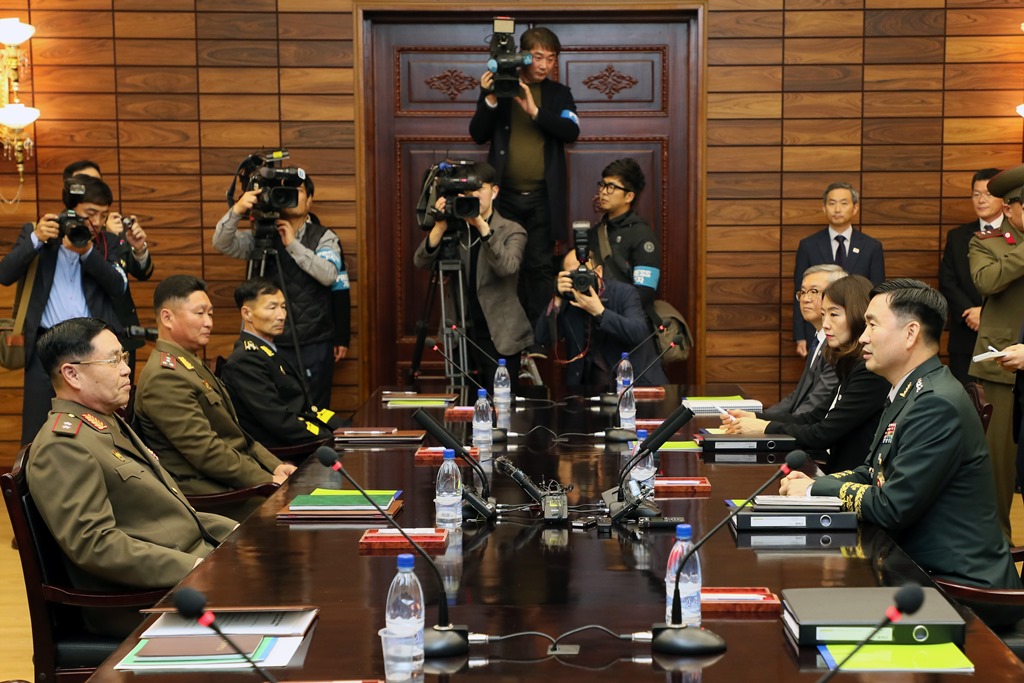Assumptions and Main Directions of North Korea’s Foreign Policy

The progress of North Korea’s nuclear and missile programmes in 2017 have strengthened the belief of the country’s authorities that they have a sufficiently strong negotiating position to start talks with the U.S. and South Korea. In his 2018 New Year’s speech, North Korean leader Kim Jong-un expressed his willingness to improve inter-Korean relations and announced that he would focus on economic development. This intent was confirmed by the April plenum of the Central Committee of the Workers’ Party of Korea. North Korea has opened to dialogue to reduce its international isolation and the sanctions pushed by the U.S. under its “maximum pressure” policy.
North Korea’s Foreign Policy Objectives
The survival of the regime remains its supreme interest. In the external dimension, this means preventing foreign interference while in the internal dimension, it means strengthening the economy by introducing reforms without relying on foreign solutions. The objectives of North Korea’s foreign policy are to ensure state security, improve its economic situation (by reducing sanctions pressure), and international recognition as a nuclear power. To achieve these objectives, North Korea has maintained nuclear deterrence and has intensified diplomatic activities in traditional directions: towards the U.S., South Korea, and China.
The United States
Relations with the U.S. are the main reference point for North Korea’s foreign policy. The June summit between Kim Jong-un and U.S. President Donald Trump in Singapore broke North Korea out of its international isolation and de facto put the North and the U.S. on an equal footing. By initiating the dialogue and wanting to maintain it, North Korea has been signalling its readiness to negotiate on its nuclear programme. In this way, it has met the expectations of the U.S., for which denuclearisation of the Korean Peninsula is a priority. The North Korean authorities have tried to authenticate their declarations of will to denuclearise, for example, the decision to unilaterally suspend nuclear and rocket tests and intention to close the Punggye-ri nuclear test site and the Tongchang-ri rocket launch site. However, key issues related to, for example, the overall control and monitoring of nuclear facilities in Yongbyon, depend on what the North terms “corresponding measures” from the U.S.
In talks with the U.S., North Korea has raised the need for a comprehensive approach to security problems rather than focusing only on the nuclear issue. In North Korea’s opinion, solving problems on the peninsula requires building trust in relations between the North and the U.S. To this end, the U.S. should accept the end-of-war declaration and agree to negotiate a peace treaty to replace the ceasefire in place since the Korean War. Without ending the hostility in relations with the U.S. and obtaining security guarantees from it, North Korea does not intend to give up its nuclear arsenal. The North calculates that American concessions in this are would result in the lifting of sanctions. Meeting the expectations of North Korea would be tantamount to recognising its status as a nuclear power, which would strengthen the country’s position on the Korean Peninsula. The long-term goal of the North may be for the U.S. to withdraw its forces from the peninsula and end the U.S. alliance with South Korea.
South Korea
The Winter Olympic Games in Pyeongchang in February facilitated the opening of political dialogue between the Korean states at the highest level. As a result, between April and September, the Korean leaders met three times. The political dialogue has been accompanied by deepening cultural contacts. There have also been talks between high-ranking military representatives, which resulted in a September agreement on limiting military tensions at the border. The sanctions imposed on the North, however, prevent the resumption of economic contacts.
North Korea treats South Korea as a channel of communication with other countries, especially with the U.S. Taking advantage of the conciliatory position of the Moon Jae-in administration, whose priority is the improvement of inter-Korean relations, North Korea wants to sew discord between South Korea and the U.S. This is especially visible in the matter of sanctions. While South Korea allows for them to be gradually lifted, the U.S. insists on maintaining them until verifiable denuclearisation. The North Korean authorities see South Korean interest in the resumption of economic cooperation, including a restart of operations at the Kaesong industrial complex. The North hopes that the inter-Korean dialogue will lead to a gradual weakening of the sanctions regime. They also expect that in exchange for a controlled de-escalation of tensions, South Korea will build up the credibility of the North as a reliable partner. During his last visit to Europe (13–21 October), Moon Jae-in urged the EU and European countries to ease sanctions on North Korea.
China
In parallel with the progress of the inter-Korean dialogue, political contacts between North Korea and China have intensified. Kim Jong-un has visited China three times, meeting with top officials including Chinese leader Xi Jinping. Kim’s visits took place at key moments of the inter-Korean talks and negotiations between the North Korea and the U.S. This is how the North Korean leader has tried to strengthen his negotiating position in the talks with South Korea and the U.S.
Kim’s actions to improve relations with China have been aimed at easing Chinese economic pressure on his regime. Because of the economic dependence of North Korea on China, which accounts for over 90% of the North’s trade exchange, the effectiveness of the sanctions on North Korea depends primarily on China’s position. Media reports from recent months indicate that China’s sanctions enforcement on North Korea is becoming less strict. In this context, it is also in the North’s favour that in the UN Security Council, China advocates easing sanctions in response to North Korea’s conciliatory attitude. The U.S.-China trade tensions are also beneficial to the North because they reduce the likelihood that the U.S. can get China to put more pressure on North Korea. Despite the political rapprochement in recent months, the North fears its over-reliance on China and therefore will strive to diversify its foreign economic partners.
Conclusions and Perspectives
North Korea’s diplomatic offensive has contributed to stabilising the situation on the Korean Peninsula. Within a few months, North Korea managed to break out of its international isolation without making serious concessions regarding denuclearisation. However, the North has remained under tough sanctions. This hinders the development of external economic cooperation and the introduction of internal reforms. While the formal lifting of the UN sanctions seems impossible due to U.S. opposition, North Korea could count on the weakening of the sanctions regime by China. In addition, South Korea would be active in areas of cooperation not covered by sanctions (such as modernisation of inter-Korea road and rail connections). Moon’s policy, focused on alleviating the sanctions, may impede U.S.-South Korea coordination on North Korea.
Kim Jong-un is not interested in abandoning his country’s nuclear arsenal. On the contrary, by opening to denuclearisation talks, North Korea seeks to gain recognition as a nuclear power. To achieve this goal, it can conditionally agree to negotiate an arms-control deal. It is possible that the North wants to follow the path of India and Pakistan, which have been de facto recognised as nuclear powers after years of international pressure.
The credibility of North Korea’s diplomatic opening would be strengthened by dialogue with other partners. There are reports of a possible Kim Jong-un visit to Russia, an invitation from Pope Francis to Pyongyang, and a meeting of the North Korean leader with the Prime Minister of Japan. North Korea’s diplomatic activity gives the EU the opportunity to resume, after a three-year break, political dialogue with that country as part of the EU’s “critical engagement” policy. It combines pressure through sanctions while keeping communication channels open. The latter may prove useful in a deadlock in the U.S.-North Korea talks. From Poland’s point of view, it is desirable to continue the negotiations on the denuclearisation of the Korean Peninsula. If these talks contribute to creating a real perspective of limiting the role, and then the elimination of nuclear weapons from the peninsula, they would strengthen the Non-Proliferation Treaty regime before the treaty’s review conference in 2020.





